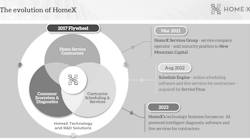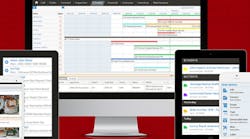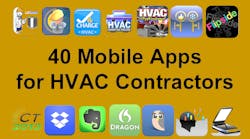Mobile field service apps are quickly becoming the industry standard for top-tier HVAC contracting companies. In fact, analyst group, Gartner, predicted that in 2016, 2/3 of the mobile workforce will own a smartphone, and 40% of the workforce will be mobile.
Stronger competition, customer demand for a better service experience, and the need to eliminate paper has led many HVAC organizations to consider mobile solutions for their service teams.
Taking into account years of mobile industry expertise, we’ve outlined the following tips to help you understand what to look for, how to compare your options, and how to take control of the mobile service software buying process.
Tip #1: Thoroughly document your business processes and know your mobile needs.
As you approach an investment like a mobile app for your team of technicians, it’s important to thoroughly document your current business processes, paying extra attention to the areas mobile will impact most heavily. For example, think about how your techs document their hours in the field today. Outline their current steps, then imagine how you’d like to see it done in the mobile app.
Tip #2: Get your field technicians on board.
Since your technicians will be the main users of whatever mobile app you choose, it’s important to keep them in the loop and consider their input. Let techs know how the app will benefit them. Because the more receptive and enthusiastic your techs are, the smoother your roll-out will be.
If techs understand the software will cut down on busy work and time spent traveling to the office, they’ll be more receptive than if they simply hear it will make the company more efficient.
Tip #3: Investigate deployment options to determine if cloud is for you.
Software as a Service (SaaS) has become a popular deployment model for field service software. Through the cloud, you can leverage a pool of resources to maximize efficiency and decrease operating costs. Cloud software relieves IT costs, eases integrations, protects and maintains data, and makes your mobile solution more flexible. Look for vendors who offer cloud deployment to give you the best options.
Tip #4: Make sure the app works offline.
When techs are working in the field, they’re often in areas that don’t get Wi-Fi or cellular service, like the middle of a field or the depths of a hospital. But, they still need to be able to do their work and collect data, which is why the app you choose should run natively and have offline functionality.
Make this your year for mobile.
Field service industry research reveals that contractors with mobile solutions vastly outperform those that don’t. Benefits of an all-in-one mobile field service solution include: higher technician utilization rates, higher first-time fix rates, better management visibility of field activity, improved customer service and better competitive differentiation.
Gain more tips to inform your mobile search. Download the full guide: Buyer’s Guide to Mobile Field Service Software to learn 11 Tips for Choosing the Perfect Mobile Solution.
Joanna Rotter is content marketing manager at MSI Data, a field service management software provider and creator of enterprise field service app, Service Pro.











